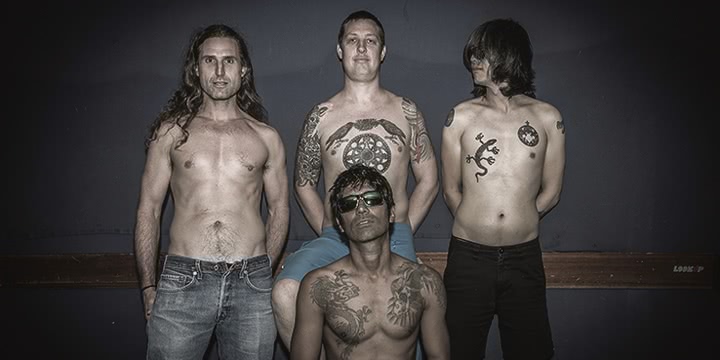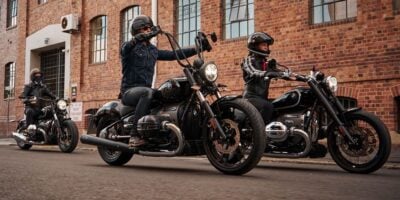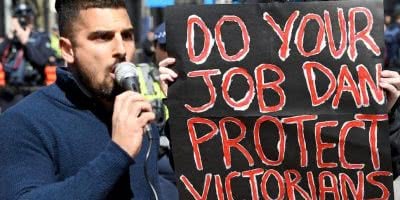Stick around long enough on Sydney’s music scene and you’re bound to witness some changes – not just to the city’s musical landscape, but to your band itself.
Stalwarts of the punk rock scene for well over 30 years, Hard-Ons are one of Australia’s most prevalent groups, and have certainly experienced their share of adjustments. This year alone they’ve undergone a colossal battle with sickness and uncertainty, the cancellation of shows on their anniversary tour, and a shakedown of their lineup. But when music is in your blood, you must persevere, and as bassist Ray Ahn explains, persevere they do.
“We’ve had problems, accidents on the road, health issues, band’s vans getting broken into,” Ahn says. “All these things happened to our band, and that happens to everyone if you stick around long enough, I guess.”
Extenuating circumstances aside, Ahn says the recent months have been an odd time for Hard-Ons. “We have to settle back to being in this band again because it’s been a funny year. Our original drummer [Keish de Silva] has come back into the band as lead singer, so we’re a four-piece now because we’ve kept Murray Ruse.
“We’ve been a three-piece for 30 years, but four of us, it doesn’t take long to get used to. We’ve only just drafted Keish and he was a founding member – the three founding members have known each other since primary school, we have a good combo.”
Together, Hard-Ons have seen and done it all. The struggles of trying to make it in the Sydney underground back in the ’80s took its toll, and Ahn vividly remembers the competitive obstacles local bands faced from international acts and commercial realities.
“We started before there was a thing called ‘alternative rock’, so you only had bands that were underground, invisible to the mainstream. In 1991, Butthole Surfers came from the US and played for 2,500 people – at the same time, they never got played on radio or on TV, but you had all these people who knew them. Later that year Nirvana went to number one and that made things harder for bands like the Hard-Ons to compete with bands who had more money, peddling better. We broke up when we got fed up. Bands that got popular were in-your-face and had commercial appeal. We had more fun because we had other bands that formed with a lot less pressure to adhere to one label.”
Hard-Ons’ hiatus was short-lived – after their 1994 split, they reunited in 1997. It remains difficult for Ahn to say how a band should measure its success, but he knows in the current climate of music and nightlife, finances are key, and that means bands are more reliant than ever on support from their fans.
“A small band back in the ’80s would maybe play in front of 100 people,” he says. “They could headline to maybe three or 400 people in their hometowns, and that was a big crowd. I remember seeing Massappeal – there were probably 400 people when they were headlining, and this is a household name – but how did they draw all the people who were into underground music? If you pulled that many people right now, it wouldn’t be as big a deal.
“The Hard-Ons headlined a sold-out show at Newtown Social Club – if we’d done that 20 years ago, that would be a small crowd. At the same time, there are a lot less people going out and watching bands than when I was a young man – all everyone wanted to do was go watch bands; I don’t know why but that’s what they did. A lot of things have disappeared from the cultural map, but at the same time, we sell more T-shirts now than when we played to more people. For some reason people spend more money on merch and shirts at gigs than they ever did.”
Hard-Ons have stayed alive in service of a fan base that needs them, and Ahn says the secret to keeping up with younger artists is simple. “The internet helps get music across easier – every band has those means – but you still have to compete. There’s better looking bands, more commercial bands – nothing has changed, you still have to learn to play guitar.”
Their invitation to appear at the inaugural Thrashville festival in February will see the Sydneysiders share a fresh set of new songs as well as touch on their back catalogue of eternal gems. “We’ll play some old stuff, things we’re familiar with and that still sound good,” Ahn says. “The thing that hasn’t changed is you still have to have a good band before you get started. So what if you’re limited? You still need a good band to be happy. I don’t see how much has changed.”
Thrashville 2017, featuring Hard-Ons,Cosmic Psychos, Clowns, Mischling, The Neptune Power Federation and more, happens Saturday January 21 atDashville, Belford.


































